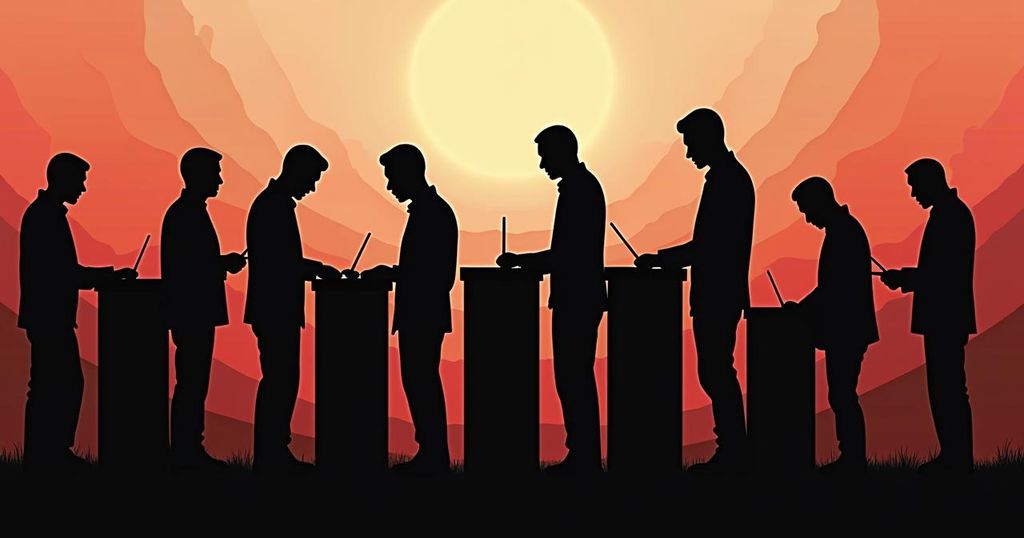Tunisian President Kais Saied is poised for re-election in an election marked by minimal opposition, as many of his rivals are either detained or excluded from the ballot. Saied’s rule has been characterized by a consolidation of power and economic struggles, with rising unemployment and a backlash against migrants. The legitimacy of the election is in question, as opposition groups call for a boycott, reflecting deepening discontent within Tunisian society. The outcome may indicate the future of democracy and governance in Tunisia amidst ongoing political and economic crises.
On the day of the presidential election in Tunisia, President Kais Saied encounters minimal competition as he seeks re-election, with his principal rivals either incarcerated or excluded from the ballot entirely. The election marks the third since the revolution that led to the ousting of President Zine El Abidine Ben Ali in 2011, setting off a wave of uprisings across the Arab world. Previously celebrated as a beacon of democracy following the Arab Spring, where it adopted a new constitution and received the Nobel Peace Prize for its commitment to political dialogue, Tunisia faces significant challenges under Saied, who first took office in 2019 as an anti-establishment figure. Saied’s initial popularity stemmed from promises of socio-economic reform and increased political power to the youth. However, his administration has witnessed a substantial consolidation of power, particularly after declaring a state of emergency in July 2021, which resulted in the suspension of parliament and the revision of the constitution. His actions have drawn criticism from pro-democracy advocates and opposition parties, who contend that these measures constitute a coup d’état. Despite the backlash, a low-turnout referendum subsequently authorized Saied’s new constitution, as authorities commended it amid a crackdown on dissent. This election, however, reveals deeper concerns about the current state of Tunisian democracy, as public support for Saied remains largely untested due to opposition suppression. Out of numerous potential candidates, only three were permitted to run: Saied, Zouhair Maghzaoui, who has criticized Saied’s economic strategies, and Ayachi Zammel, a businessman facing legal troubles for alleged voter fraud. Many leading opposition figures have been imprisoned, including Rached Ghannouchi of the Ennahda party. Simultaneously, Tunisia copes with a dire economic situation, witnessing a rising unemployment rate of 16% and ongoing negotiations with the International Monetary Fund (IMF) for a bailout package, which Saied appears reluctant to accept due to stringent conditions. As the economy flounders, there has been an alarming surge of illegal migration attempts to Europe from Tunisia, compounded by Saied’s controversial stance towards sub-Saharan migrants. On the international stage, Tunisia maintains relations with its traditional Western allies while seeking new economic partnerships, particularly with China and Iran. Saied’s administration underscores national sovereignty, asserting that Tunisia will not serve merely as a border patrol for Europe. Nevertheless, European leaders continue to recognize Saied’s agreements on migration as exemplary efforts for the region. As Tunisians vote today, the implications of this election extend well beyond immediate political outcomes; they signal the broader trajectory of Tunisia’s commitment to democracy and stability amidst economic and social challenges.
The context surrounding the Tunisian presidential election highlights significant challenges faced by the country since the Arab Spring. Tunisia’s emergence as a democratic model in a region marred by turmoil initially sparked optimism, marked by constitutional reforms and democratic engagement. However, over the past years, political divisions, economic difficulties, and Saied’s consolidation of power have cast shadows over this optimism. The political landscape has shifted dramatically, with dissent being met with stringent measures, leading to a climate of apprehension regarding the future of democracy in Tunisia.
The presidential election in Tunisia reflects the precarious state of the nation’s democracy and political landscape, amplified by the lack of viable opposition and ongoing economic strife. President Kais Saied’s stronghold on power amid criticisms of authoritarianism raises critical questions about Tunisia’s democratic trajectory and the potential for change amidst widespread discontent. With key opposition figures sidelined and repression rampant, the future of political pluralism in Tunisia hangs in the balance as the nation navigates complex socio-economic challenges.
Original Source: www.euronews.com






